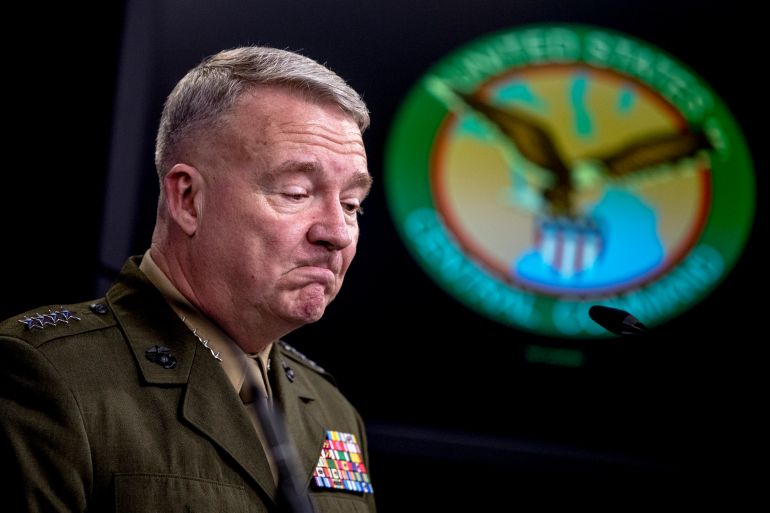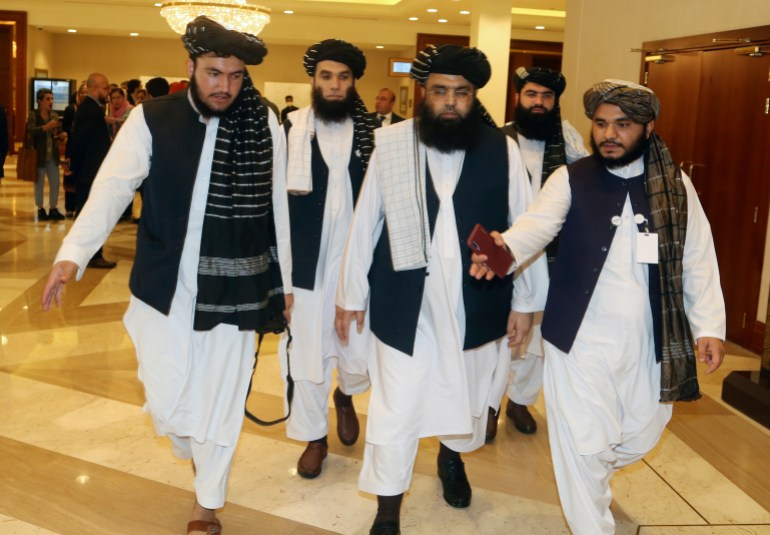US Gen McKenzie has ‘grave doubts’ about Taliban’s reliability
Foreign troop withdrawals have raised concerns that Afghanistan could become a fractured state, erupt in civil war

A top US general said on Tuesday that he had grave doubts about the Taliban’s reliability as a negotiating partner, as the United States is set to remove all its troops from Afghanistan in the coming months and focus on diplomacy.
Last week President Joe Biden said all US troops would be withdrawn by September 11, to end the US’s longest war, rejecting calls for US forces to stay to ensure a peaceful resolution to Afghanistan’s grinding internal conflict.
Keep reading
list of 3 itemsTop US envoy Blinken in Afghanistan for troop withdrawal talks
‘Terrorism threat has moved’ from Afghanistan, says top US envoy
Under former President Donald Trump, the Taliban negotiated an agreement with the US, in negotiations that did not include the Afghan government, for the withdrawal of US forces in exchange for security guarantees. Some US officials have said the Taliban have not fulfilled their part of the deal.
“I have grave doubts about the Taliban’s reliability … but we need to see what they’re going to do here,” US Marine General Frank McKenzie, the head of Central Command which directs forces in Afghanistan, told a US House Armed Services Committee hearing on Capitol Hill.

“If they want any form of future international recognition for Afghanistan … they’re going to have to keep the agreements that they’ve made,” McKenzie said, adding the US military would still be able to observe them and verify their actions.
The Taliban ruled Afghanistan from 1996 to 2001, when they were removed by US-led forces, after the September 1, 2001 attacks on New York City and Washington, DC. Since then they have waged a long-running rebellion and still control wide swaths of territory.
The foreign troop withdrawals have raised concerns that the country could erupt in full-scale civil war, providing al-Qaeda space in which to rebuild and plan new attacks on US and other targets.
A United Nations report in January said there were as many as 500 al-Qaeda fighters in Afghanistan and that the Taliban maintained a close relationship with the hardline group. The Taliban has denied al-Qaeda has a presence in Afghanistan.
Announcing his decision to withdraw troops, Biden said the US would monitor the threat, reorganise counterterrorism capabilities and keep substantial assets in the region to respond to threats emerging from Afghanistan.
McKenzie said he would provide the Secretary of Defense Lloyd Austin a plan for counterterrorism forces outside of Afghanistan by the end of the month. He cautioned that the loss of the current US military network in Afghanistan, and the intelligence capability it allows, would have an effect.
“If you’re out of the country and you don’t have the ecosystem that we have there now, it will be harder to do that. It is not impossible to do that. It will just be harder to do it,” he said.
His testimony came as a US-backed conference between the Taliban and the Afghan government that was scheduled to begin April 24 had been postponed until mid-May, the Reuters news agency reported.
An Afghan government spokesman declined comment on the matter. A Taliban spokesman did not immediately respond to a request for comment.
Turkey’s Foreign Minister Mevlut Cavusoglu of Turkey, one of the hosts of the talks, said the talks had been put off until after the Muslim holy month of Ramadan, adding that participation in the conference remained unclear.
A top White House official said on Sunday that no one could offer guarantees about Afghanistan’s future after foreign troops leave, even as he stressed the US would stay focused on threats emanating from the country.
In addition, some 7,000 NATO troops and 6,000 US contractors including those who support the Afghan military with tasks such as maintenance of aircraft, would be withdrawn.
McKenzie said he did not “want to minimise” the potential loss of US intelligence capabilities and support for the Afghan military that removal of contractors would entail.
Whether that would degrade the government in Kabul’s ability to defend itself from Taliban attacks would depend on whether the country fractures after a US withdrawal, McKenzie said.
“It would depend on if the nation as a whole, if the nation is fractured, if there’s a civil war,” McKenzie said.